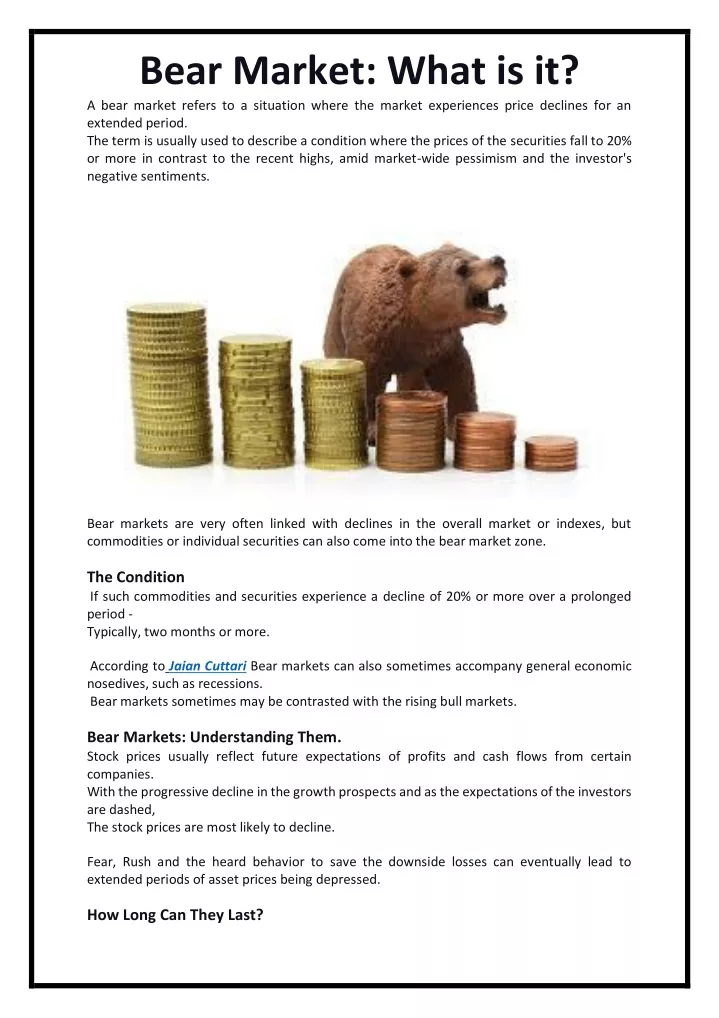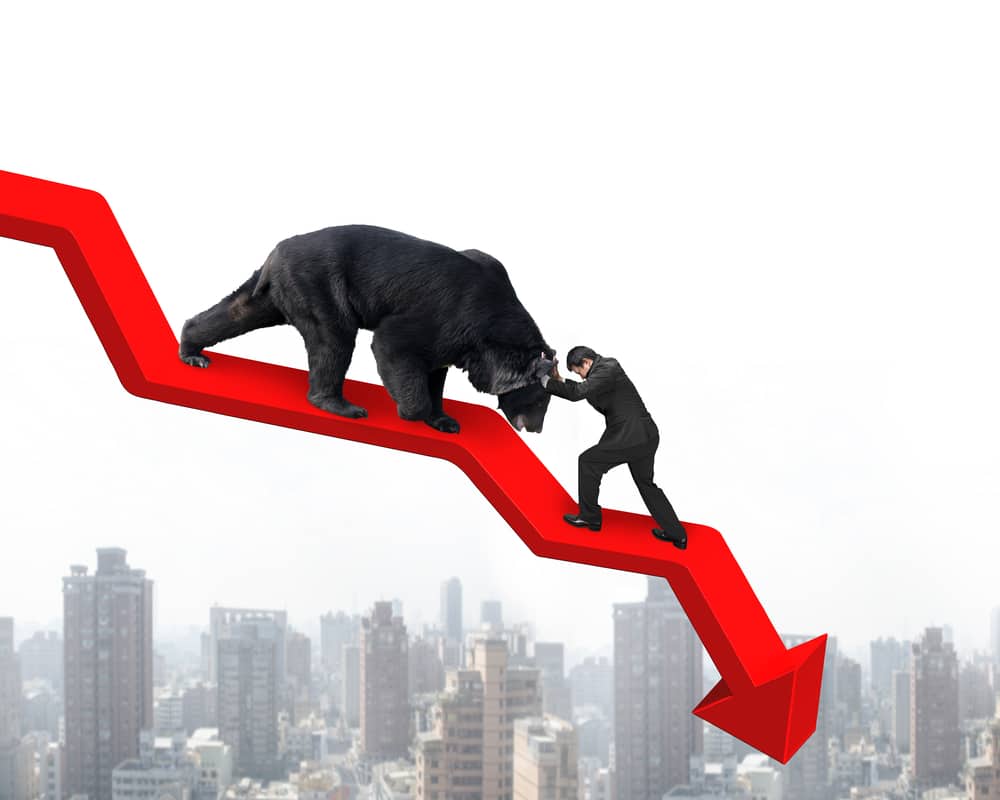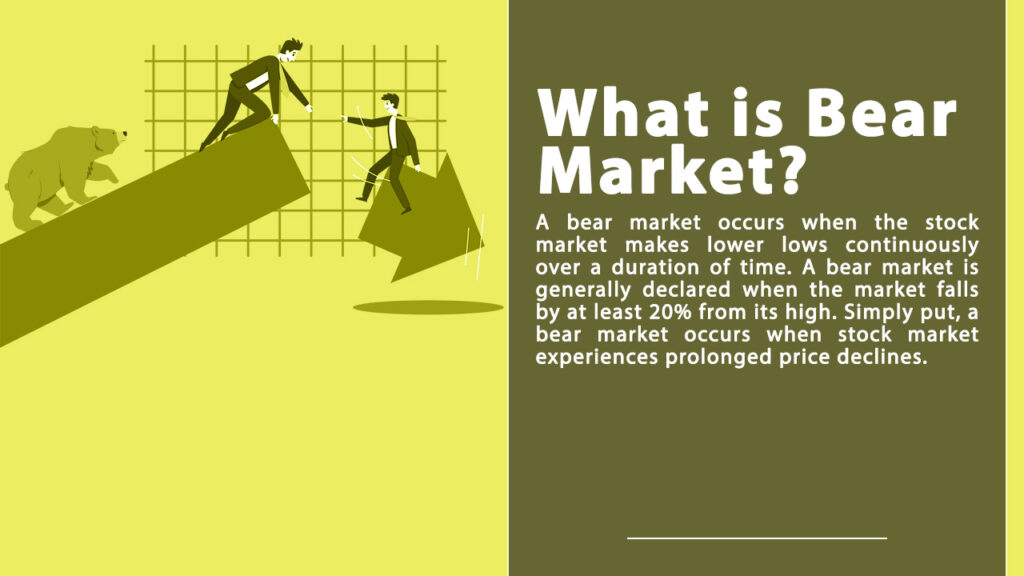Out Of This World Info About What Happens In A Bear Market

Navigating the Downturn
1. Understanding the Bear's Roar
Alright, let's talk about bear markets. Not the cuddly kind, unfortunately! A bear market, in simple terms, is when the stock market experiences a significant and sustained decline — typically a drop of 20% or more from a recent high. Think of it like this: the market's been partying, and then suddenly, the DJ cuts the music, turns on the lights, and everyone realizes the punch was watered down. Panic ensues (or at least, a fair amount of unease).
Now, why does this happen? Well, usually it's a combination of factors. Maybe the economy's looking shaky, with rising unemployment or slowing growth. Perhaps inflation is rearing its ugly head, forcing the central bank to hike interest rates. Or maybe there's just a general sense of pessimism in the air, fueled by geopolitical events or corporate scandals. Whatever the reason, investors get spooked and start selling off their stocks, accelerating the downward spiral. The keyword term "What happens in a bear market" is central to understanding market downturns, with the part of speech being a noun phrase, crucial for this article.
Its easy to get caught up in the negativity during a bear market. Headlines scream about losses, analysts predict further doom, and your neighbor starts giving you investment advice (which you definitely didn't ask for). It's tempting to join the stampede and sell everything, but that's often the worst thing you can do. Remember the old saying: "Buy low, sell high"? Bear markets are when things are... well, low. It's a chance to scoop up quality stocks at bargain prices, if you have the stomach for it (and the available funds, of course!).
The length of a bear market can vary quite a bit. Some are short and sharp, lasting only a few months. Others can drag on for a year or two, leaving investors feeling like they're trapped in a never-ending financial Groundhog Day. Predicting the exact duration is impossible — if anyone tells you they know for sure, run the other way! But historically, bear markets have always been followed by bull markets (periods of rising stock prices), so it's important to keep a long-term perspective.

What Is A Bear Market Explained With Investing Tips // Unstop
The Domino Effect
2. How a Bear Market Impacts Your Wallet (and Beyond)
So, what exactly happens when the bear comes to town? It's not just about your stock portfolio shrinking (although that's certainly a part of it). Bear markets can have wider-reaching effects on the economy and your personal finances. Think of it as a financial domino effect.
One of the first things you might notice is a decline in consumer confidence. When people feel less wealthy (because their investments are down), they tend to cut back on spending. They might postpone that vacation, delay buying a new car, or eat out less often. This decrease in consumer spending can then lead to slower economic growth, as businesses see their sales decline. It can even lead to layoffs and increased unemployment, further exacerbating the problem.
Businesses, too, get cautious during bear markets. They might delay investments in new equipment or expansion plans, worried about future demand. They may also become more reluctant to hire new employees, adding to the unemployment woes. This can create a vicious cycle, where economic weakness leads to further market declines, which then leads to more economic weakness. It's not a pretty picture, but it's important to understand the potential consequences. Remember, though, that many companies see bear markets as opportunities to innovate and improve their operations, emerging stronger on the other side. Adaptability is key.
Beyond the economy, bear markets can also affect things like real estate prices (although this usually lags behind the stock market decline) and interest rates. The Federal Reserve might lower interest rates to try to stimulate the economy, which can make borrowing cheaper. But it can also reduce the returns on savings accounts and other fixed-income investments. In short, a bear market touches nearly every aspect of the financial landscape. Its truly understanding 'What happens in a bear market' and its effects that allows for informed financial decisions.

Bear Market Strategies
3. Turning Lemons into Lemonade (or Stock Options)
Okay, so a bear market sounds pretty scary, right? Well, it doesn't have to be all doom and gloom. In fact, with the right strategies, you can not only survive a bear market, but potentially even come out ahead. Think of it as a financial survival course — with potentially lucrative rewards.
First and foremost, it's crucial to stay calm and avoid panic selling. As mentioned earlier, selling your investments at the bottom of the market is usually a recipe for disaster. Instead, try to take a long-term perspective and remember why you invested in the first place. If you're investing for retirement, for example, a short-term market downturn shouldn't derail your long-term goals. This highlights the importance of understanding 'What happens in a bear market' in relation to your investment strategy.
Another strategy is to consider dollar-cost averaging. This involves investing a fixed amount of money at regular intervals, regardless of market conditions. When prices are low (like during a bear market), you'll buy more shares. When prices are high, you'll buy fewer shares. Over time, this can help you to lower your average cost per share and potentially increase your returns when the market eventually recovers. It's like setting your investment strategy to auto-pilot, removing emotional decisions from the equation. A little boring? Perhaps. Effective? Absolutely.
Finally, use this opportunity to re-evaluate your portfolio and make sure it's properly diversified. Diversification means spreading your investments across different asset classes (like stocks, bonds, and real estate) and different sectors (like technology, healthcare, and energy). This can help to reduce your overall risk and cushion the blow during a market downturn. Think of it like not putting all your eggs in one basket — if one basket falls, you still have other eggs to rely on. Maybe not the freshest metaphor, but you get the idea!

When Stocks Bear Markets The New York Times
Beyond the Basics
4. For the Financially Savvy (or Aspiring to Be)
Alright, for those of you who are feeling a bit more adventurous (or maybe just a little bit crazy), let's delve into some more advanced bear market strategies. These aren't for the faint of heart, so proceed with caution and always do your own research (or consult with a financial advisor).
One popular tactic is short selling. This involves borrowing shares of a stock that you believe will decline in value and then selling them. If the stock price does indeed fall, you can then buy back the shares at a lower price and return them to the lender, pocketing the difference as profit. Sounds easy, right? Well, not so fast. Short selling is extremely risky because your potential losses are unlimited. If the stock price goes up instead of down, you could end up losing a lot of money. It's definitely not for beginners!
Another option is to consider investing in inverse ETFs. These are exchange-traded funds that are designed to move in the opposite direction of a specific market index. So, if the S&P 500 goes down, an inverse S&P 500 ETF should go up (and vice versa). Again, this can be a way to profit from a bear market, but it's also important to understand the risks involved. Inverse ETFs often have higher fees than traditional ETFs, and they may not perform as expected over the long term. Treat them as short-term tactical tools, not long-term investment strategies.
Finally, you could consider investing in alternative assets, such as gold or commodities. These assets often perform well during bear markets, as investors seek safe havens to protect their capital. However, it's important to remember that alternative assets can also be volatile and may not be suitable for all investors. Make sure you understand the risks and potential rewards before investing in anything you don't fully understand. Understanding 'What happens in a bear market' can help you position your investments accordingly.

FAQ
5. Answering Your Burning Questions
Let's tackle some of the most common questions people have about bear markets. Think of it as a bear market Q&A session.
Q: How long do bear markets typically last?A: It varies! Historically, bear markets have lasted anywhere from a few months to a couple of years. There's no magic number, and predicting the exact duration is impossible. Just remember, they always end eventually!
Q: Is a bear market the same as a recession?A: Not necessarily, but they're often related. A recession is a significant decline in economic activity, while a bear market is a decline in stock prices. Sometimes a bear market precedes a recession, and sometimes it happens concurrently. But they're not always perfectly aligned. The keyword 'What happens in a bear market' can occur independently of a full recession.
Q: Should I sell everything and hide my money under my mattress?A: Probably not! While it's tempting to panic and sell, that's usually the worst thing you can do. Remember the long-term perspective and consider strategies like dollar-cost averaging. Hiding your money under your mattress might feel safe, but it won't earn you any returns and inflation will eat away at its value over time. Plus, it's terribly uncomfortable to sleep on.
